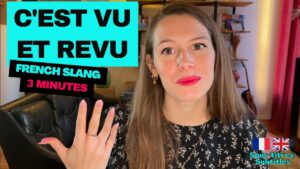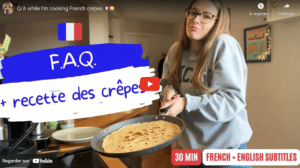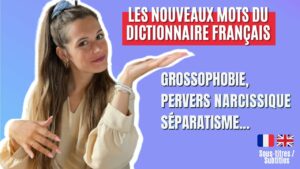Transcript video vocabulary in French Emily in Paris
Hello everyone. This is Elisabeth from Hellofrench. I hope you're well and that your learning French is going well. Today, we're going to take a look at the vocabulary from the Emily in Paris series. A short while ago, I made a video to tell you about the expressions and vocabulary you learn in the first three episodes of this series, Emily in Paris, on Netflix. Today, I'd like to take a look at episodes 4, 5 and 6 and the vocabulary they contain.
This will make it easier for you to understand the video and retain the new vocabulary you're about to learn. If you're new to the channel, don't forget to subscribe and activate the bell so you don't miss any videos. Let's start right away with episode 4, entitled "a kiss is just a kiss". At the very beginning of the episode, we see Emily in a florist's shop. A florist is someone who has a store where you can buy flowers, bouquets and plants.
Emily wants to buy pink roses. She can't express herself very well in French, so she says les rosés rosés. She's got the pronunciation wrong. In French, we say roses, so that's the type of flower. And the color is rose, so pink roses. Pink is a color, it's a mix between red and white, like the color of my T-shirt. She's going to tell the florist "je peux les fleurs" because she doesn't know how to express herself in French, let alone how to express herself politely. What she'd like to say is "pourrait-je avoir ces fleurs" or "je voudrais ces fleurs". When she gets home, someone says "Mademoiselle, your packages have arrived". In French, paquets are parcels, so it's something you get delivered by post, for example. She's got lots and lots of parcels, so she's going to ask her building's janitor for help. She'll say "Madam, it's possible...". And then, she stops because she sees that the janitor doesn't want to help her.
C'est possible is a phrase we use to ask if something is feasible. You start with "c'est possible de" to ask someone for something. For example, in a restaurant, I might say "is it possible to have two starters rather than one main course? In this context, Emily is trying instead to ask for help in a slightly more correct, polite French: she should say "Madame, pourrait vous m'aider?" The babysitter replies "je suis occupe" (I'm busy), so in French, when you say you're busy, it means you're doing something, you don't have time or she can't help, she's busy. At the office, her colleague will say to her "you are the one who brings the drama" and she answers "Moi? Moi, in French, is a personal pronoun like "je" for first person. So "je" is used in front of a verb. For example, I dance, I eat, I go to the theater.
Moi is a tonic personal pronoun. It's used to refer to one or more people in a group. It's moi, toi, lui, elle, nous, vous, eux and elles, plural with an s. So it's really used to distinguish a person or other people, to emphasize that person or those people. For example, I'm going to say "it's him, not me who ate all the cake". His colleague will also say "Oh what a coincidence!"
In French, coïncidence means chance. It's when events happen that you couldn't foresee, it's really chance, you didn't think of it. In this case, he's using irony. He's using an ironic tone. That means he's thinking the exact opposite of what he's saying. He's thinking that it's not a coincidence, that it's not a coincidence, so he uses a tone like "what a coincidence".
When Emily walks down the street, she says "merde, I walked in a shit". Merde in French is a word we use very often. We use it when we're pissed off. It's an expletive, an insult. Often, we don't use it towards anyone. It's really when something happens to us and we're pissed off or angry. Her friend Mindy says "Good luck biche". Biche in French is a nickname you can give, often to a girl, even all the time to a girl.
It's an affectionate little nickname, sweet like my darling. In reality, the doe is an animal. You may have seen the cartoon Bambi. Bambi's mother is a doe, the female deer. But in French, as I was saying, it's used as a nickname. You might say "t'es trop belle, ma biche" or "ça va biche?". One of the agency's perfume clients will say "you have to counterbalance the smells". Smells are what you smell with your nose. For example, I might say "these flowers smell really good", meaning that the flowers smell good. Counterbalance is a verb used to mean to balance. So when we want to counterbalance smells or tastes, we're looking for the right balance, something that's a bit in the middle. For example, in cooking, you might say I'm going to use lemon to counterbalance the very sweet taste.
In this episode, we also hear "bonsoir monsieur". Bonsoir is like bonjour, but for the evening, from about 6 p.m. onwards. You can say "bonsoir" or "bonsoir monsieur", "bonsoir madame", "bonsoir mademoiselle" or bonsoir and a first name, for example "bonsoir Mathieu". We also hear the word coquin. It's used here to refer to the perfume that will be used to scent a hotel. Coquin is a word that means daring, something a little sensual. In this context, it's used like that. Coquin can also be used to refer to someone who's a bit mischievous, a bit playful, often a child. We'll say "ah what a rascal, what a rascal this child is, he keeps hiding every time I look for him". In the episode, someone will say "it was incredible". Incroyable is the French word for extraordinary, fantastic. Here, it was used to talk about a meal that was delicious, but you can use the word incroyable to talk about a person, an event. For example, I can say "I went to a Céline Dion concert, it was incredible, she's incredible". In this episode, it's not really a vocabulary word, but we realize a mistake that can be common for Americans in France. Emily will make a mistake, confusing dates. In France, when we write dates in figures, we always write the day, the month and the year. For example, if you want to say August 11, 2020, you'll say 11/08/2020 and not the opposite as in the United States, where you'll say 08/11/2020. So you have to be careful not to make a mistake when scheduling a business appointment or booking a play, for example. That's all for episode 4, so let's move on to the vocabulary for episode 5, called "False Friends". False friends are not at all, for example, a friend of mine who was mean to me, hypocritical, it has nothing to do with a story of friendship.
When we talk about faux amis in French, we're really talking about words in our language compared to words in another language that are very similar, but don't mean the same thing. Sometimes this can lead to awkward situations, because we think that a word in English or French is very close and therefore means the same thing, when in reality they don't mean the same thing at all. As we see in this episode, Emily and Mindy on a café terrace, at first they just say "bonjour, je voudrais un café, s'il vous plaît", which is a way of ordering. Emily will say "I'd like a croissant with a condom". Because in English, préservative is jam. In French, it doesn't mean the same thing at all. And besides, the waiter is going to be a bit annoyed. In French, a condom is something you use when you have sex with someone to protect yourself.
So, not to get pregnant, not to get sick. Mindy then explains other words that sound similar in English and French, but don't mean the same thing.
For example, a crayon in French is something you use to write on paper, or a crayon you use to color. Mindy also explains that chalk is something you use to write on the blackboard. Often, it's the teacher. It's a little white or colored stick that you use to write on the board. She also explains that a doctor is a synonym, meaning the same thing as a doctor.
So I can say "I'm sick, I'm going to the doctor, to my doctor". In the episode, we also hear "hi mon amour, ça va?". We've already seen ça va, it's a familiar way of asking someone if they're all right. Mon amour is a nickname in French. It's an affectionate nickname generally used for the person you love, i.e. your lover, husband or wife. But you can also use it with very close friends, or your child, for example. In the episode, we also hear "Tchin Tchin". In French, it's like "santé", when you toast. With two glasses, it's like "tchin tchin", when you have a drink with someone. Finally, the last word of the episode is "pas possible", Emily will say "everything is pas possible". It's true that in France, we often say that things aren't possible. If you're dealing with the administration, for example, they'll often say "oh no, that's not possible".
It means that something isn't feasible, isn't achievable. Emily feels that, I think, often people say it's not possible because they don't really want to do the thing, for example. Let's move on to episode 6, which is called Ringarde. Now, the word nerdy for a girl or nerdy for a boy, we use to talk about someone who's a bit old-fashioned. Here, it's a stylist who's going to use it to talk about Emily, because she's got a little Eiffel tower on her handbag, he's going to say "she's really cheesy", she's not fashionable. In this episode, we also see the word flâneur. Flâneur is for a boy and flâneuse is for a girl. The word is used to refer to someone who wanders around, wanders around aimlessly, just wanders around and has no objective, hangs around, goes to the stores a bit, doesn't do anything in particular. There's also the verb flâner. I can say je flâne, tu flânes, il flâne, nous flânons, vous flânez, ils flânent. We also hear the adjective sublime. When something is sublime, it means it's really beautiful. For example, I might say "this dress is sublime, it's magnificent, it's really, really beautiful". Finally, the last vocabulary word we see in this episode is the expression "la petite mort".
Mindy will explain to Emily that in French, we use this expression to talk about an orgasm. Une petite mort is because it's like dying for a few seconds. It's not an expression that's used that much, it's not used in everyday life at all, but it's an expression that exists, of course, in French. That's it for today, I hope you've been able to learn some new words or expressions thanks to the video and thanks to this Emily in Paris series.
If you're new to the channel, don't forget to subscribe. I'm going to put the vocabulary we've seen here in a practical sheet on the www.hellofrench.com website, and I'll see you soon. Have a nice day!








